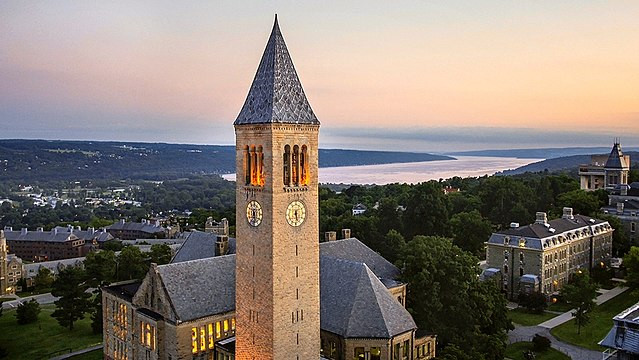Amid escalating global tensions related to Middle East conflicts, Cornell University's Ithaca campus, a renowned Ivy League institution, was thrown into turmoil over explicit anti-Jewish threats. 21-year-old Patrick Dai, a junior engineering major, was apprehended by authorities and faces potential imprisonment of up to five years for his menacing online remarks.
Dai, originally from Pittsford, New York, was arrested following an urgent investigation into threats to "bring an assault rifle to campus" and specifically target Jewish students. He's accused of posting alarming threats on a public school forum, including direct intentions to "shoot up 104 west," which is predominantly a kosher dining hall, and "slit the throat" of Jewish men. The dark shadow of his threats was intensified by the recent graffiti on campus sidewalks reading "F-k Israel."
Joel Malina, the Vice President for University Relations at Cornell, communicated the institution's shock over the incident, asserting that they would push for a rigorous legal response. He confirmed, "We remain shocked by and condemn these horrific, antisemitic threats and believe they should be prosecuted to the full extent of the law." Additionally, he assured that heightened security measures would remain in place across the campus.
The emergence of these threats coincides with a broader surge in antisemitic incidents across the U.S. This comes in the aftermath of the unexpected attacks on Israel by Hamas militants earlier this month. According to the Anti-Defamation League, antisemitic occurrences in the US saw a nearly 400% rise following the Hamas attack on Israel. FBI Director, Christopher Wray, underscored this sentiment in a recent Senate hearing, highlighting that antisemitism in the U.S. is hitting "historic levels."
These increasing tensions are markedly noticeable on college campuses. Universities nationwide have witnessed student-led protests, and institutions like Harvard and the University of Pennsylvania are striving to strike a balance. They're grappling with recognizing diverse student concerns while handling backlash from significant donors who demand a defined stance on the ongoing conflict.
Cornell's Jewish student community, making up roughly 22% of the student body, has been severely shaken by the threats. Zoe Bernstein, president of Cornellians for Israel, voiced the unprecedented fear and anxiety the threats have sparked, saying, "It's really, deeply troubling and upsetting."
New York Governor Kathy Hochul reiterated her commitment to public safety in the wake of the incident. Highlighting the gravity of the situation, she stated, "Public safety is my top priority and I'm committed to combatting hate and bias wherever it rears its ugly head."
In an attempt to address the deeper-rooted issues of antisemitism and discrimination on campuses, Gov. Hochul has enlisted Jonathan Lippman, the former chief judge of the New York Court of Appeals. Lippman is set to review the existing "policies and procedures related to antisemitism" particularly focusing on the City University of New York.
As Cornell University joins other institutions in navigating the complexities of global conflicts and their local implications, the hope remains that campuses can be places of safety, respect, and understanding for all students.




